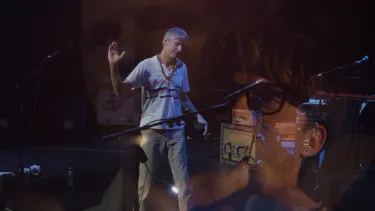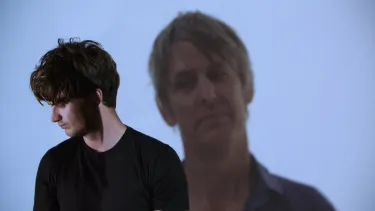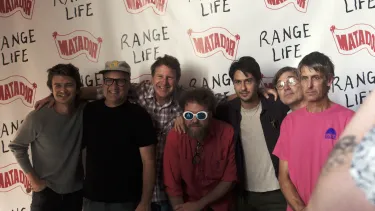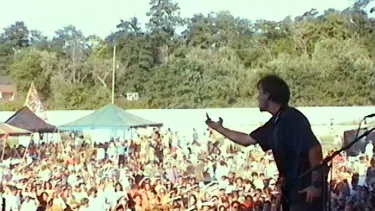Pavements tells the truth by telling a bunch of lies
Published

One of the more amusing twists in the career of Pavement, cult icons of the 90s, is the recent attempts to decode a band that have forged their career on being undecodable. Coming to fame amidst the grunge explosion, but drawing more on the art-rock surrealism of bands like The Fall than the metal and punk of their contemporaries, Pavement’s career has seen them reject coherence at every turn.
There’s no “story” to Pavement as a band, really, other than a very brief bit of tension with the Smashing Pumpkins. Nor is their music overly primed for analysis: a song like ‘Cut Your Hair’ isn’t about anything more than the textural pleasures of its scuzzed-out guitar riffs, and choruses that go off like car bombs. What does it all mean? Well, is it a cop-out to say both everything, and absolutely nothing at all?
Spare a thought, then, for those currently trying to fashion them into a more legible shape. You see it everywhere, from the teenagers on TikTok who have tasked themselves with the unenviable job of making sense of frontman Stephen Malkmus’ nonsensical lyrics, to the convoluted annotations on Genius that don’t so much grasp at straws as they do mistakenly assume there are straws there to be grasped at all.
Given that, it’s entirely fitting that Alex Ross Perry, the acclaimed director of the new documentary about the band, Pavements, has turned in a subversive, meta-textual document that makes fun of the very idea of making a film about Pavement. (Even its title may be a joke – Perry is a regular guest on the film podcast Blank Check, where a long-running bit involves the story of director James Cameron pitching his Alien sequel by writing the title of the first film on a whiteboard, adding an ‘s’ to it, and then turning the ‘s’ into a dollar sign.)
In essence, Pavements is three films in one. There’s the straight documentary, featuring talking heads interviews with the members of the band, and footage of them rehearsing for their reunion tour. This section of the film is the most factual, but its real purpose is to undercut the other two sections of the film – for Perry as director to make it clear when he’s making stuff up.
And make stuff up he does. The other two sections of the film are a scramble of falsity – albeit falsity that’s presented in the most authentic way imaginable. There’s a fake Pavement biopic, starring Joe Keery of Stranger Things and Djo fame, which, with tongue firmly in cheek, tries to fit the band’s story into the rise and fall narrative common in music docos, complete with Oscar bait-y emotional speeches.
And, finally, there’s a very straight-faced presentation of two Pavement inspired art punk projects, both mounted for the film. There’s a Pavement musical, written for real by Ross Perry, and staged for a paying audience, off-Broadway. And there’s a pop-up museum of Pavement trinkets, some of them real, some of them fake, presented to an adoring crowd and launched with an evening of Pavement covers, performed by some of indie rock’s most acclaimed luminaries.
If that all sounds overwhelming, then that’s sort of the point – Pavements is a long and convoluted way of telling a story about a band that doesn't have a story. It’s more decoding efforts that are deliberately doomed, and don’t decode much at all: the real pleasure of the film is that very failure of making sense.
Indeed, such trickery, falsehoods, and artificiality make Pavements closest in line to something like Orson Welles’ F For Fake, a depiction of an art scam that was itself a sort of art scam. That film also presented itself as a documentary, while still feeling more than free to fib its way through its running time. And like Welles, Perry is telling porkies for a reason: particularly in the Keery-led section of the film, he hints at who Pavement are by showing who they absolutely are not.
Indeed, this is the true magic trick of Pavements. Through its artificiality, it finds a stunning amount of earnestness, and by being honest about his dishonesty, Perry has crafted a tone free of pretension. Pavements isn’t trying to get one over you, or manipulating for the sake of manipulation. Like a Pavement song, the film is fun, a sort of kaleidoscopic, chaotic blast of game-playing.
All this also means that there’s no prior knowledge required of the band before viewing – you genuinely don’t have to be a fan to get something out of it. You don’t even have to be a hater. There’s enough humour and spark here for Pavements to appeal to Joe Keery fans, to film lovers, maybe even to dyed-in-the-wool Billy Corgan supporters.
I first saw the film at a screening as part of SXSW Sydney, along with a diverse group: some, like me, were Pavement diehards. Some were total neophytes. One of my friends just wanted to “see Joe Keery’s beautiful face blown up big.” All of us emerged from the screening buzzing from what we’d just seen. Did we enjoy ourselves? Absolutely. Did we learn anything? Depends what you mean by “learn”, I guess. And if that sort of non-answer appeals to you, then every inch of Pavements was made for your enjoyment – lies and all.
In a special preview, the film Pavements will be showing at the Sydney Opera House Playhouse 7 September 2025.



